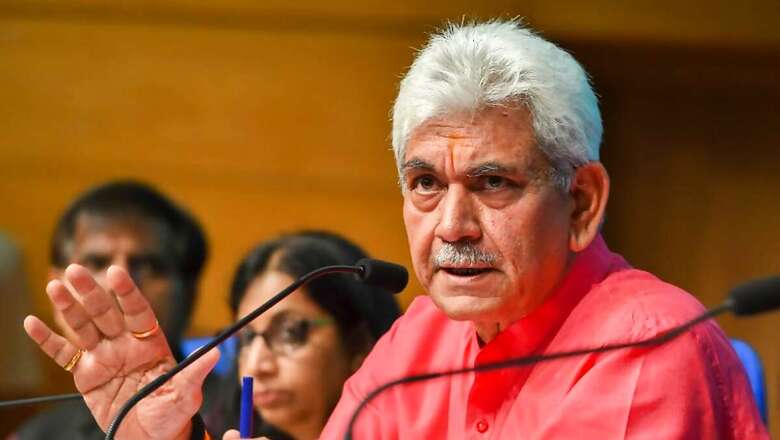
views
The appointment of Jammu and Kashmir's second Lieutenant Governor Manoj Sinha, who was a part of the Union Cabinet of the Narendra Modi 1.0 government, could be seen in context of a series of recent developments in Kashmir that are ultimately hinting towards the recreation of political space in the Valley.
Releasing political detainees, including former Chief Ministers Omar Abdullah and Farooq Abdullah in March and Sajjad Lone, a former separatist leader who hailed Modi as his “elder brother”, was another step towards easing political restrictions in Kashmir. The first clear hint that the administration was thinking of elections in the valley was dropped by former L-G Girish Chandra Murmu last November when, at a passing-out parade of a batch of constables in Jammu, he had said, “J&K has a legislature and a process for holding Assembly elections will be initiated soon. The existing administrative arrangement will not last long.”
In June again, Murmu spoke about assembly elections saying they would be conducted after the delimitation exercise is complete. Although the Election Commission raised objections to his statements saying that conducting and notifying the time of elections was the sole remit of the poll panel, adding, “Covid-19 has introduced a new dynamic, which has to be and shall be taken into consideration at the due time.”
The EC last October conducted the first-ever Block Development Council (BDC) elections in post-Article 370 J&K in which the BJP emerged as the single largest party.
Also, within the past year, an interesting political event has happened in the Valley – the creation of Jammu and Kashmir Apni Party (JKAP), which is led by former leaders of the Peoples Democratic Party (PDP), National Conference (NC), Congress and Shah Faesal’s Jammu and Kashmir Peoples Movement (JKPM). Announcing it on March 8, former state finance minister and ex-PDP leader Altaf Bukhari, who is the JKAP chief, called it a party “by the commoners and for the commoners”. The creation of the new political entity was welcomed by the BJP.
The appointment of veteran Sinha, who has been in active politics since the early 1980s, is likely to help create a conducive atmosphere in which J&K’s political parties, which haven’t held any rallies or roadshows or any major event to connect with their workers and voters, will be encouraged to return to active political work again. Although he is likely to face challenges on many fronts, including the continued detention of many important political leaders, including former Chief Minister Mehbooba Mufti, Congress’s Saifuddin Soz and former IAS officer-turned-politician Shah Faesal. At least two dozen political leaders are still in detention even a year after the nullification of Article 370.
Even if the political leaders are out of jail, they are likely to, as was indicated by Omar Abdullah in a recent interview, go back to working on realising the “Gupkar Declaration”. This was a declaration signed at the residence of Farooq Abdullah on August 4 when his son Omar Abdullah, Mufti, and other senior political leaders of NC, PDP, CPI(M), People’s Conference, and Congress had resolved to “remain together and stand united” to safeguard the identity, autonomy, and special status of the state. Senior leaders like Abdullah have already clarified that they will not contest assembly elections till J&K remains a Union Territory.
While JKAP was not created when the Gupkar Declaration was signed, the party has also clarified it “will fight to get J&K’s special status reinstated”. Bukhari has spoken about the restoration of J&K’s statehood and “protection of government jobs and domicile laws to protect their land rights”.
The reluctance of the voter, in the backdrop of the cold-blooded murders of elected panchayat leaders, will also face the new L-G. Three sarpanches have been killed in Kashmir since August 5 last year. Moreover, in the absence of 4G internet connectivity, which has still not been restored a year down the line, political campaigning is going to be tough for the parties. However, Sinha's appointment may only be the beginning of a long-drawn political process.

















Comments
0 comment